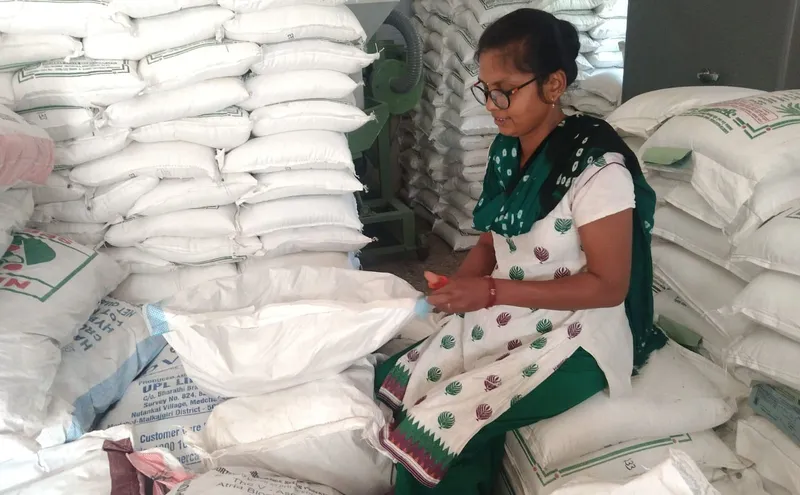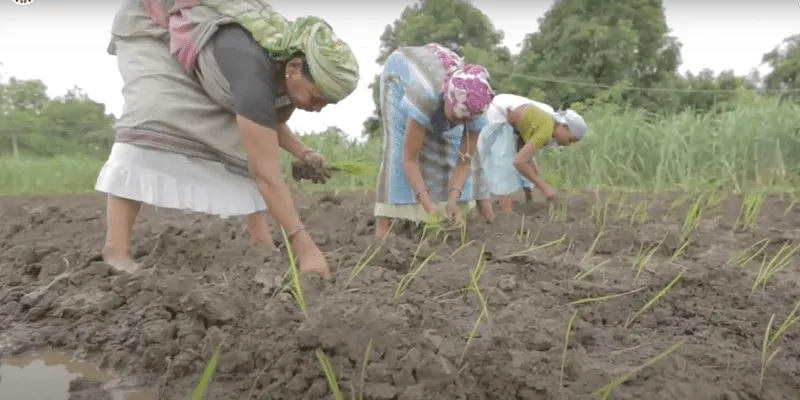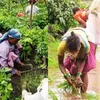How Megha Mandli is improving the lives of women farmers in Gujarat’s Tapi district
Social Story spoke to Sangitaben, an agewan in the collective, about how the organisation is socially and economically empowering women farmers.
A report by Oxfam reveals that nearly 75 percent of all full-time farm workers in India are women, and they produce 60 percent to 80 percent of food in the country. However, a third of women farmers work as unpaid labourers and women own only 12.8 percent of the country’s land.
Co-operatives have played a key role in financially empowering women and giving them access to finance, the latest agricultural information, and market links to sell their produce. Among the oldest is the Self Employed Women’s Association (SEWA) in Gujarat, which was established in 1972.
Megha Mandli, a part of SEWA, was registered in 2014, and is creating livelihood opportunities for women by giving them access to agricultural tools and seeds. It also gives them access to insurance, healthcare, savings, and credit services. It currently has 1,001 members from Gujarat’s Tapi district.

Sangitaben is a farmer who is a member of SEWA's Megha Mandli, a 1,001 member collective of women farmers in Gujarat.
Among them is 35-year-old Sangitaben Bipinbai Gamit of Chichbardi village in Tapi’s Vyara taluk. Sangitaben’s association with SEWA began eight years ago, when she worked as an agewan (leader) in Shri Gujarat Mahila Lok Swasthya Sewa Sahakari Mandali Ltd, a health initiative. She joined Megha Mandli two years ago, and is the first woman from her village to join the collective.
“I first heard about Megha Mandli from an agewan in another village. Then a leader, Madhuben from Ahmedabad, who was conducting area meetings for a health drive in Tapi, asked me to join Megha Mandli and explained the benefits that I could get as a woman farmer.”
Sangitaben and her husband are both involved in farming and rearing cattle. “We are dependent on the monsoon for our crops and grow okra, black-eyed peas, and onion. There are six people in my family, but I live separately with my husband, daughter, and son,” she tells SocialStory on a call from her village centre.
Prior to joining the collective, Sangitaben and her husband were dependent on hybrid seeds and pesticides for their crops.
“When I joined, I learned about certified organic seeds and how they were better for us and the environment. They also gave us seeds that we could cultivate and this has given us a better yield. We also make all our own compost for the farm. We get assistance not only with our healthcare, but also with government subsidies, which includes lower prices on agricultural tools,” she says.
The members (they are considered shareholders) in the collective also gain better access to various government and health schemes. The introduction of organic farming has not only resulted in better yields and reduced expense, the disuse of chemical fertilisers has also resulted in better health for the farmers. With financial empowerment a key focus area, the collective also encourages economic independence and social security.
“I went to the Saatvik Mela in Ahmedabad for the first time after joining Megha Mandli. We make organic gur (jaggery) and papad (snacks), but we did not know how to sell them to people or what the real value of these products was. I now get a better rate for the products and have the courage to sell them at the organic markets,” she says, adding that a portion of the money goes back into the collective and the rest is given to the farmer. She says that she is confidently able to face people and sell the products that she has made and is not dependent only on the harvest.

Megha Mandli is a co-operative of 1,001 women farmers in Gujarat's Tapi district
ALSO READ

However, Sangitaben says that being a woman farmer comes with its unique set of challenges. Sangitaben says that while she and her husband take decisions regarding the land and their family together, none of the land is in her name and she has no legal claim on it. There are also other challenges. “When my husband was unwell, I found it very difficult to operate all the heavy machinery on the farm by myself. The truck that takes the produce to the market every morning leaves at 6 am, and it was a struggle as the responsibility to finish the housework was also mine.”
With a son in ninth grade and a daughter in the seventh, she says they are free to make their own decisions when it comes to a career. “I will only guide them when I feel they could do something that will harm them. Otherwise, I want them both to be independent.”
She believes the government should have more schemes to support women farmers. “They should give us marketing support so that we can sell our products confidently by ourselves. Women’s names need to be there on all land deeds to secure our future. I only have a bank account, ration card, and Aadhaar card. If something were to happen to the men in our homes, we don’t know who will get the land and what our future will be,” she says.
Sangitaben says that Megha Mandli has stood by her through some very difficult times, including the pandemic, when they were unable to send the harvest to Delhi to be sold. “Life would have been very different without this family of women who support each other,” she says.
YourStory’s flagship startup-tech and leadership conference will return virtually for its 13th edition on October 25-30, 2021. Sign up for updates on TechSparks or to express your interest in partnerships and speaker opportunities here.
For more on TechSparks 2021, click here.
Applications are now open for Tech30 2021, a list of 30 most promising tech startups from India. Apply or nominate an early-stage startup to become a Tech30 2021 startup here.
Edited by Megha Reddy







